BIBLE LESSONS
THE RESULTS OF BRAGGING AND FAVORITISM GENESIS 37
KEY VERSES PER MAIN VERSES (HIGHLIGHTED IN BLUE):
A. Genesis 37:1-11; Genesis 12:7; Genesis 15:18; Genesis 21:3; Genesis 25:25-26; Luke 2:51
B. Genesis 37:12-20
C. Genesis 37:21-27; Genesis 14:12-16; Exodus 3-15; Joshua 2:1-21; 1 Samuel 23:1-5; Esther 4-8; Luke 10:2537; John 8:3-11;acts 9:23-25; Acts 16:25-31; James 4:17
D. Genesis 37: 28-36; Leviticus 19:11; Proverbs 6:16-19
THE LESSON
Setting the Stage
Jacob, a son of Isaac, was the father of twelve sons. His second youngest son was named Joseph. The Bible tells us that he was Jacob’s favorite son. This lesson has Joseph as a teenager - seventeen to be exact. He’s not quite an adult yet. He has some growing up to do. And, as this lesson points out, parents showing favortism to one of their children does not go unnoticed by the other siblings.
A.
Dreams and Favoritism (Genesis 37:1-11)
Verse 1 of chapter 37 starts off telling us that Jacob is living or residing in the land of Canaan (see box below). Keep in mind that Jacob and his family have not yet taken possession of their land/their inheritance.
As we move into verse 2, we read that Joseph “was pasturing” the flock. Was he by himself? No, he was (cont. on p. 2)
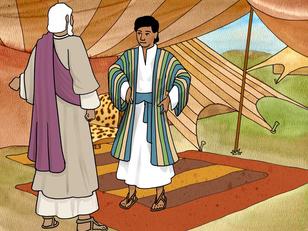
KEY WORD(S):
Dreams; loved him more; sheaves; stars; bowed down; pit; Ishmaelites; sold; tore his clothes; mourning; Egypt.
MAIN CHARACTERS:
God, Joseph, Jacob, Joseph’s brothers
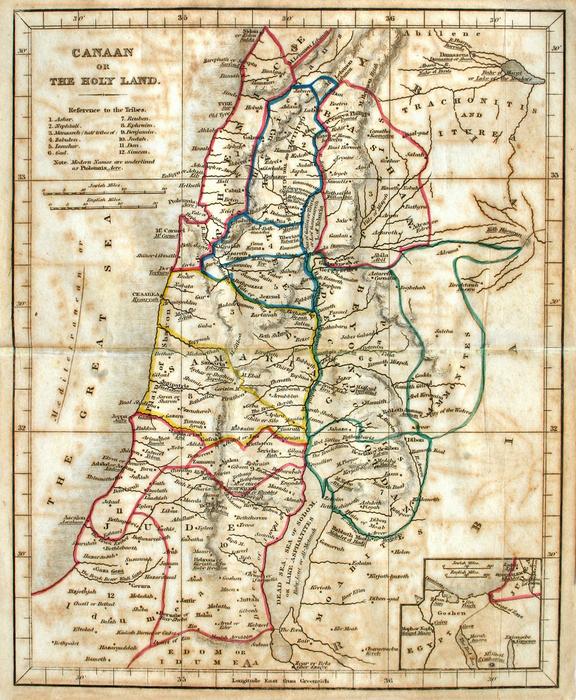
The Land of Canaan
It is otherwise known as “the Promised Land.” God promised this land to Abraham and his descendants. The Lord told Abram (later named Abraham) in Genesis 12:7, “To your offspring I will give this land.” In Genesis 15:18, “the Lord made a covenant with Abram, saying, “To your offspring I give this land, from the river of Egypt to the great river, the river Euphrates.” The land is thought to have been around 300,000 square miles! In it were influential major cities of Jericho, Hebron, and Sidon.

with some of his brothers. And during this time he was observing them, taking notes of their actions and behaviors. Apparently, they weren’t doing as they should as the last sentence says that Joseph “brought a bad report of them to their father.”
In verses 3 and 4, we read of the love, and yes, favoritism shown to Joseph by his father Jacob. He gave Joseph a “robe of many colors.” This would be like Jacob giving Joseph a shiny new car to drive while his brothers got clunkers! How do you think the brothers felt? Jealousy?
Yes. Angry? Yes. Children are able to pick up on their parents’ feelings toward them, obvious or not.

The actions put forth by Jacob for all to see made a wider gulf between Joseph and his brothers. Verse 4 says that “they hated him and could not speak peacefully to him.” There was so much hostility and envy that the brothers had for Joseph that they weren’t able to do things with him. Envy brings nothing but harm to the table.
Matters get worse as we read verses 5 through 10. We’re told that Joseph had a dream and was apparently eager to tell his brothers. The dream essentially said that Joseph would one day be a leader (“my sheaf arose and stood upright”). Now a sheaf was “a bundle of cut stalks of grain or similar plants bound with straw or twine.” Then Joseph says “And behold, your sheaves gathered around it and bowed down to my sheaf.” In verse 9, Joseph had another dream. In this case, Joseph said “the sun, the moon, and eleven stars were bowing down to me.” Jealousy was on the rise with Joseph’s brothers.

Questions:
Who was Jacob’s father? Isaac (see Genesis 21:3)
Did Jacob have a brother? Yes, his name was Esau. (See Genesis 25:25-26)
What do you think “pasturing the flock” means? (see 37:2)This is telling us that Joseph was a shepherd. He was herding the animals into a pasture. He was bringing them to where they needed to be.
Who is the main shepherd in our lives, always herding us to where we need to be? Jesus.
Do you know the meaning behind the “robe of many colors?” Whoever wore the robe was designated to be the future head of the household. Who is it normally given to? The firstborn son. Who was the firstborn son under Jacob? Reuben.
Do you think Joseph was aware of the situation with his brothers? Yes, he no doubt was. We all can sense when someone is envious or jealous. At this point, did the brothers have any remorse for their open hostility to Joseph? Sadly, it doesn’t appear so.

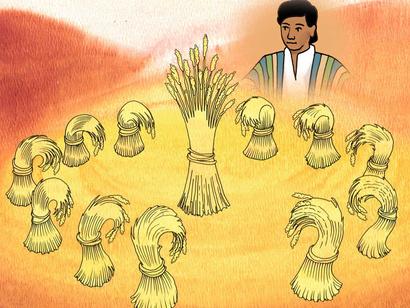
B. The Brothers Take Issues Into Their Own Hands (Genesis 37:12-20)
In this section of chapter 37, we read about the treachery, the betrayal, by Joseph’s brothers. In verses 12 through 17, Joseph is on a mission to find his brothers. Israel (Jacob) is concerned and wants to know that all “is well with your brothers and with the flock.” Most parents are like Israel. They want (cont. on page 3)
Illustration by John Paul Stanley. wwwYoPlace com
B.
to know their children are okay and that all is well with the tasks they’ve been assigned. After finding out such information, Israel wants Joseph to report back to him.
However, as he gets closer to where he thought his brothers ought to be, a man approaches him (see verse 15). He tells Joseph in verse 17 that “they have gone away, for I heard them say, “Let us go to Dothan.” So on went Joseph to Dothan, almost a 15 mile trek from where he was in Hebron. Think about this as you read further: Dothan was a “site more convenient for contact with merchants using the main trade route on their way to Egypt.”
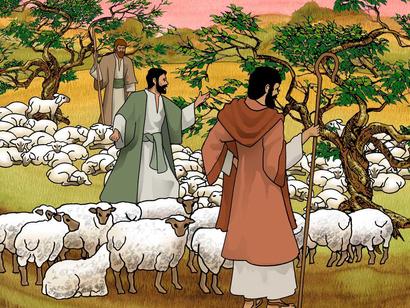
Upon approaching his brothers, they connived to “kill him and throw him into one of the pits.” (See verse 19). It is sad what comes from hate and envy. There is no room for either one of these feelings or emotions, back then or today. Envy - being jealous of someone else - brings nothing but misery. The 10 Commandment says “Thou shall not covet.” The word covet means to desire something that someone else has. Today, as well as thousands of years ago, God has provided each of us with many blessings. Favoritism has no place in a home - we must not use it to harm others. God, our heavenly Father, is faithful. He’s our provider, our need filler, who shows no favoritism to anyone. He loves us all! th
C. Reuben and Judah Attempt to Hinder Plans (see Genesis 37:21-27)
Seeking to harm others is not a solution. It does not befit mankind to do so. Reuben, the firstborn son, interferes with his brothers’ plan for Joseph. He says in verse 21, “Let us not take his life.” Although he said this, his plan wasn’t much better. “Shed no blood; throw him into this pit (continued on page 4)
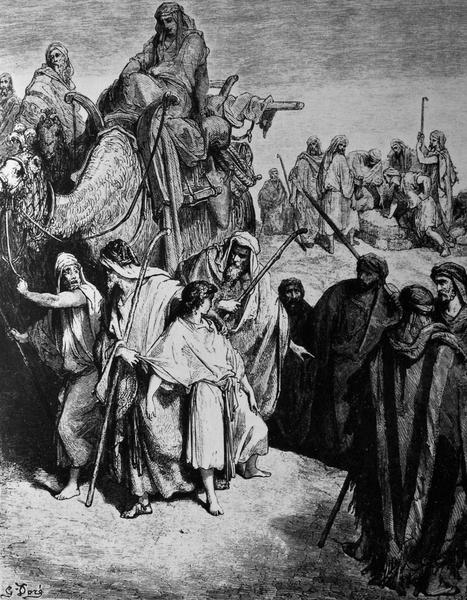
Questions:
Did Reuben’s brothers listen to him? Yes, they did somewhat. They took off of Joseph the robe of many colors and threw him into a pit. A pit that was void of water. Reuben was looking for a complete rescue, but as we will soon read, his brothers had other plans. What other brother of Joseph intervened, preventing the other men from killing Joseph? Judah (See verse 26). What then happened? Joseph was sold to the Ishmaelites for twenty shekels of silver. This was the average price of a slave in the second millennium BC. Now the Ishmaelites were also known as the Midianites (identified in verse 28). They were descendants of Ishmael and of Abraham. Who was Ishmael’s mother? Hagar.

The criminal behavior of selling a brother into slavery was later prohibited (by the Mosaic legislation; see Deuteronomy 24:7).
C. Reuben and Judah Attempt
to Hinder Plans

(cont. from page 3)
here in the wilderness, but do not lay a hand on him.” His desire was to “rescue him out of their hand to restore him to his father.” (See verse 22) Another brother, Judah, sought to make a profit off of Joseph versus bringing any harm to him. In verse 27, Judah says “Come, let us sell him to the Ishmaelites, and let not our hand be upon him, for he is our brother, our own flesh.” There seemed to be little to no remorse among Joseph’s brothers in doing so........
Where in the Bible are there other stories of someone rescuing another?

Abraham Rescuing Lot (see Genesis 14:12-16)
Moses Liberating the Israelites (see Exodus 3-15)
Rahab Hid the Spies (see Joshua 2:1-21)
David Saved Keliah (see 1 Samuel 23:1-5)
Esther Stepped In For Her People (see Esther 4-8)

The Good Samaritan (see Luke 10:25-37)
The Adulterous Woman Rescued by Jesus (see John 8:3-11)
Paul’s Companions Rescued Him (see Acts 9:23-25)
Paul Saved the Philippian Jailer From Committing Suicide (see Acts 16:25-34)
D. Joseph is On His Way to Egypt (see Genesis 37:28-36)
The Ishmaelites gave Joseph’s brothers twenty shekels for him. In the second Millennium BC, this was the going price for a slave. What was going through Joseph’s mind during this time? Did he realize the plans God had for him?
When Reuben went to the pit to retrieve Joseph, he was no doubt startled that his younger brother wasn’t there. He would shortly join in the lies and coverup. When the brothers told lies to their father, Jacob, he was heartbroken. He “tore his garments” as well. See verse 34. With verse 36, we read the beginning of the next chapter of Joseph’s life: “the Midianites had sold him in Egypt to Potiphar, an officer of Pharaoh.” Potiphar is the captain of the guard.
Questions:
Why did Reuben tear his clothes? Why was he so distraught? Well, even though he wasn’t present at the time his brothers sold Joseph to Ishmaelites, he (like the others) would be held responsible for the treachery. He became a party to the lying, to the cover-up. James 4:17 tells us “So whoever knows the right thing to do and fails to do it, for him it is sin.” Reuben knew from the beginning that this plan against his brother, Joseph, was wrong. For us today, the wonderful news about the Gospel is that we can come to God with our sins, sincerely ask for forgiveness, and we will be forgiven. Jesus came to save us. He made a way to have a relationship with God. See verses 30-35. With Reuben, the sad thing is that he really wanted to save his brother Joseph. (See Genesis 42:22)
How does God feel about lying? He doesn’t like it. In Proverbs 6:16-19, Solomon gives us a list of things that God does not like. In verse 17, he mentions “a lying tongue.” In verse 19, Solomon tells us that God does not like “a false witness who breathes out lies.” In fact, the ninth Commandment says “You shall not bear false witness against your neighbor.” Now, your neighbor isn’t necessarily living in the house or apartment next you. It could be anyone that you’ve chosen, unfortunately, to lie about. In Leviticus 19:11, God instructs Moses to tell the people “You shall not steal; you shall not deal falsely; you shall not lie to one another.” So you can see, God hates lying.
Hint: You see, Joseph’s brothers sought to kill their brother. However, in the end, Joseph became (as Joseph Farah states) “the salvation for his father’s entire family - and the whole Abrahamic line in the form of the budding nation of Israel.”
What is the irony of this situation with Jacob? He deceived his father, Isaac (see Genesis 27:18-29) and now was deceived by his own sons.
